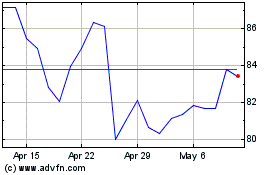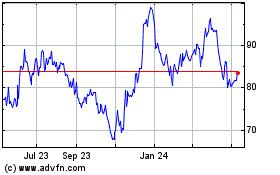The U.S. recreational boat industry has likely stopped sinking,
but it faces a slow recovery and an unpredictable future.
Sales of recreational power boats fell to a record low of
132,000 vessels last year, a 55% decline from 2006 and down 14%
from 2009. While the industry is widely seen as having bottomed out
last year, the momentum behind an upturn remains unclear. Some
projections have sales rising as much as 10% this year, but few
forecasters are willing to say when or if sales will ever return to
the 300,000 boats a year the industry averaged in the 14 years
prior to 2007.
The dynamics that sustained the industry for years changed
significantly during the economic recession. Largely gone are the
easy access to credit and the disposable income from rising real
estate values, factors that helped send first-time boat buyers to
showrooms and prompt existing boaters to move up to more expensive
models.
Rising fuel costs and elevated unemployment levels, especially
in such coastal states as California and Florida, have further
damped enthusiasm for boating among those who own boats. The
average annual number of days owners used their boats dropped by
more than a week between 2006 and 2009.
"I think we'll be a lot smaller industry, but that doesn't mean
we'll be a less profitable industry," said Phil Keeter, president
of the Marine Retailers Association of America, who expects boat
sales to eventually plateau at about 200,000 units a year. "I don't
think boating is going to go away."
Keeter's sentiments are shared by many in the boating industry
who are counting on lower overhead costs, slimmed down boat
inventories and fewer dealers and boat brands to create a healthier
industry for the survivors.
Brunswick Corp. (BC), the largest boat and engine builder in
U.S. by annual sales, closed 17 plants, furloughed 45% of its
worldwide work force and eliminated eight boat brands since 2007.
The company estimates those moves will lower expenses by $420
million a year. Brunswick's remaining brands include Bayliner,
Meridian, Sea Ray, Lund, Hatteras and Mercury engines.
"While we were going through this [downturn] we knew we had to
come out differently," Brunswick Chairman and Chief Executive
Dustan McCoy said during a presentation to investors. "We had to
have a significantly lower cost base. We had to come out of this
much more efficient."
McCoy's goal is for Brunswick to earn as much money from an
industry that sells 200,000 boats a year as it did when industry
sales were 300,000 boats a year. McCoy projects Brunswick should be
able to break even if industry sales are no better than 135,000
boats this year.
The Illinois-based company also sells bowling, billiards and
fitness equipment, but hasn't reported a profit since 2007.
However, McCoy expects the company to earn between 5 cents and 40
cents a share in 2011.
"Brunswick did a pretty good of [showing] just how lean they
could become," said James Hardiman, an analyst for Longbow
Research. "If they hadn't, they would not be in business right
now."
The number of U.S. boat dealers has fallen by more than 40% in
recent years to 3,100. Boats from those shuttered dealerships
flooded onto the used-boat market at rock-bottom prices. That
depressed demand for new boats, which accounted for just 15% of all
boats sold last year.
"Our biggest competitors became our own boats that were being
repossessed," said Irwin Jacobs, cofounder of boat maker J&D
Holdings LLC in Minnesota.
Jacobs previously presided over Genmar Holdings Inc., the
second-largest U.S. boat builder behind Brunswick. But the
privately held company's debt problems forced it into bankruptcy in
2009. Genmar, which had annual sales of $1 billion before the
downturn, was sold last year to California private equity firm
Platinum Equity for about $70 million. Jacobs managed to buy back
six of Genmar's boat brands, including Carver, Marquis and Larson,
and three of its factories. Jacobs sees J&D's sales reaching
about $200 million this year.
"For the first time in two years, I have some sincere optimism,"
he said.
The glut of boats on the market from failed dealerships has
eased in recent months, forcing more boat buyers to consider new
models at full price. Sales from regional boat shows this winter
have been running ahead of last year, with demand strongest for
smaller, lower-priced motor boats and pontoon boats.
Kurt and Robin Anstaett were among those looking at pontoon
boats at last month's Chicago Boat, RV & Outdoors Show. The
suburban Chicago couple are building a waterfront home in
Michigan.
"We'll buy a boat, but not sure what kind of boat," said Kurt
Anstaett. "People are definitely buying boats. The dealers aren't
giving them away."
But loans for boats from banks, credit unions or finance
companies remain tight and consumers are cautious about taking on
additional debt, dealers say. Unlike auto companies, boat
manufacturers don't operate finance companies for their retail
customers.
"People are still scared" of buying, said Warren Moulis, owner
of a Brunswick dealership in Fox Lake, Ill. "If [Brunswick] could
do the retail side financing, our industry would be back on its
feet in no time. People are sick of sitting around. They want to
get out on the water."
-By Bob Tita, Dow Jones Newswires; 312-750-4129;
robert.tita@dowjones.com
Brunswick (NYSE:BC)
Historical Stock Chart
From May 2024 to Jun 2024

Brunswick (NYSE:BC)
Historical Stock Chart
From Jun 2023 to Jun 2024
